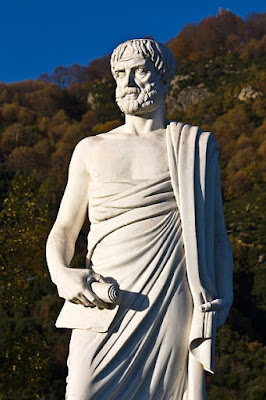Tragedy is an imitation of an action that is grave, complete, and of a certain magnitude; in language embellished with each kind of artistic ornament, the various kinds appearing in separate parts of the play; in the form of action, not of narrative; with incidents arousing pity and sympathy; with which to carry out the Catharsis of such emotions is dread.
Therefore, every tragedy needs to have six parts: Plot, Characters, Diction, Thought, Spectacle, and Music are the parts that make up a story, and they all affect its quality.
At least 50 years passed after Sophocles' passing before the treatise known as the Poetics was written. Oedipus the King, written by Sophocles, was greatly admired by Aristotle, who regarded it as the ideal tragedy. Surprisingly, his analysis best matches that play. In order to explain the following key points of Aristotle's theory of tragedy as a literary form, I will use this play.
The "rule of likelihood or necessity" (mimesis) states that tragedy is the "imitation of an action."
According to Aristotle, tragedy is a dramatic form rather than a narrative one; tragedy "shows" rather than "tells."
Aristotle asserts that tragedy is higher and more philosophical than history because tragedy dramatizes what might occur, or "what is feasible according to the law of probability or necessity," whereas history only recounts what has already occurred.
Thus, tragedy deals with the universal while history deals with the specific. Events may have occurred by accident or coincidence; they may have been unique to a given circumstance and not have followed a clear cause-and-effect sequence. They therefore don't really matter to other people.
Tragic events, on the other hand, are rooted in the universe's basic structure; they provide a cause-and-effect chain that amply illustrates what could occur at any moment or location since that is how the world role. Because the audience can picture themselves as part of this cause-and-effect chain, tragedy elicits both pity and dread.
By placing focus on various definitional elements, we can extrapolate a
number of Aristotelian characteristics of a tragedy from the one
presented above.
Aristotle believed that tragedy and art were both imitations. He asserts that imitation is a natural human instinct. He asserts that tragedy ought to imitate human behaviour. Otherwise, it wouldn't have any impact on the reader's or viewer's psyche.
2)Finished and Serious:
Aristotle believed that tragedy needed to be comprehensive and serious in nature. Complete refers to the terrible events' integration and comprehensiveness, which paint a full picture of the tragedy. And by serious, he means that a tragedy ought to have gravity. Its conduct must to be significant enough and not inconsequential.
3) Particular Magnitude:
A tragic hero also needs to have status and take comprehensive, serious action that is of a specific degree. A man of high position and money is the tragic hero. Otherwise, his misery or demise would not have an impact on people.
4) Use of creative and enjoyable language:
In his definition, Aristotle also mentions language. He believed that a tragedy's vocabulary should be creative, imaginative, metaphorical, and appealing. Figures of speech must be used correctly.
5) Through Action, rather than Narrative:
Aristotle believed that a tragedy shouldn't just be told through narration, but should always be presented to the audience as human action.
6) Catharsis brought on by sympathy and terror:
The right catharsis or purgation of the emotions, in Aristotle's view, is the purpose of a tragedy. According to him, tragedy should arouse feelings of sympathy and terror. By using these emotions to the audience's advantage, these feelings can then be completely cleaned by being released through catharsis or purgation.
The six elements of a tragedy are plot, character, thought, diction, music, and spectacle, which are enumerated here in order of importance.
Plot
The plot is the primary principle and, in a sense, the heart of a tragedy, according to Aristotle.
Character
According to Aristotle, character is what shows a person's moral purpose and demonstrates the kinds of actions they take or refrain from taking.
Thought
"Thought is the faculty of saying what is possible and pertinent in certain circumstances," claims Aristotle.
Diction
As has already been stated, Aristotle defines diction as "the representation of meaning in words; and its essence is the same whether in verse and prose."
Music
Song "holds the chief place among the embellishments," according to Aristotle on music.
Spectacle
The spectacle according to Aristotle, "has an emotional draw of its own, but it is the least artistic of all the parts."
By-
Sriparna Mukherjee
Student
Amity University Kolkata


Comments
Post a Comment